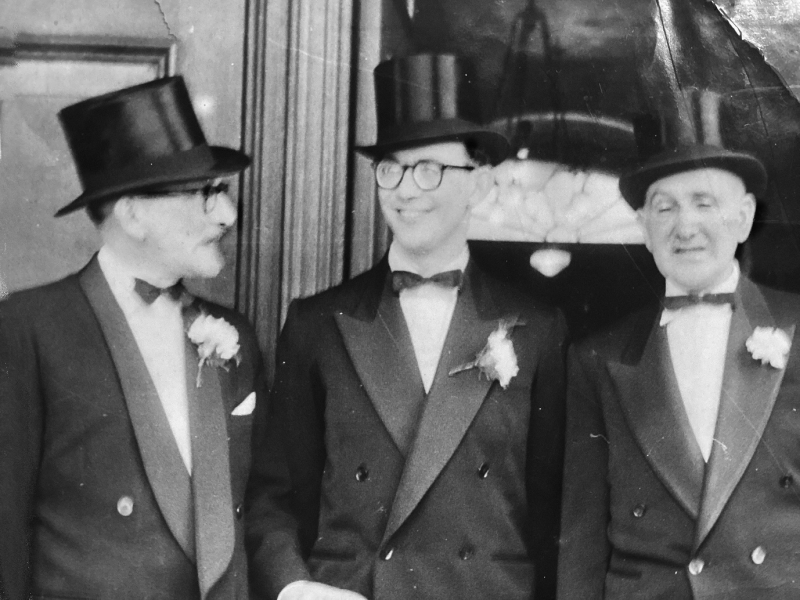A former Epsom Long Grove Hospital patient remembered for his pacifism
Barney Cohen (1897–1970)
By his nephew, Andy Strowman
There is a very quiet cemetery in London — East Ham Jewish Cemetery. You may be the only visitor there apart from the grave workers. Among the rows of stones lies one marked Barnett Cohen — the only one there by that name.
Barney, as the family called him, was born in 1897 in Whitechapel. His parents were Milka (Millie) and Hershel (Harris) Cohen, and the family lived at 17 Milward Street, behind the London Hospital. His brothers were Jack and David, his sisters Rachel and Rose. The same house later became my home too, long before I was born.
Barney grew up in hard times. Like so many of his generation, he left school at fourteen and joined the garment trade. He was gentle by nature, a man who never said a bad word about anyone. I think he lacked confidence — something I have inherited too.
When the Second World War broke out, he enlisted. But when faced with the prospect of killing, he refused. He simply could not harm another human being. For that courage — for it was courage — he was punished. He was placed in the guardhouse and later imprisoned in Wormwood Scrubs as a conscientious objector.
In prison he suffered terribly. His weight fell to five and a half stone. My grandmother Millie, desperate to save him, sought help from her sisters in North London. Together, they visited a government office, and — as the old East End saying goes — the brown envelope changed hands. Only then was he released.
A retired officer once told me what those conditions were like: “You wouldn’t have liked it in there. Tiny cells, no space, noise all night — shouting, banging, threats. We only stepped in if someone started hitting you.”
Barney came out of prison changed. He was nervous, forever scratching, anxious about his work. If he worked beside his brother Jack, he was always asking, “Is this all right?”
When I was sixteen, my mother told me that Uncle Barney had endured six sessions of electro-convulsive therapy at Long Grove Hospital in Epsom — the same hospital that later held Ronnie Kray. Long Grove closed in 1992, but its shadow remains.
Yet Barney was no shadow. Despite his suffering, he radiated kindness. He loved to make people laugh, performing little magic tricks that delighted us as children. Once, when I was about eight, he came to visit us during his lunch break from the Ellis and Goldstein factory. While he talked to my mother, I quietly bolted the front door so he couldn’t leave. My mother struggled with the latch and he burst out laughing — a moment of warmth I have never forgotten.
He married Dolly, and my mother, then fourteen, was his bridesmaid. Life was not easy for them. Poverty, mental illness, and misunderstanding strain any family, and in those days help was scarce and sympathy rarer still.
Barney once told a story about visiting London Zoo on a Sunday in his best suit. A commotion broke out near the monkey cage; he joined the crowd, only for one of the monkeys to run off and return — to spit a mouthful of water all over his suit. The crowd roared with laughter, and so did Barney. That was his nature — to laugh even when the joke was on him.
He died in 1970, still working, collapsing at his workplace at Ellis and Goldstein in Aldgate. His brother Jack said simply, “He always lacked confidence. If I was sewing beside him, he kept asking, ‘Is this all right?’”
Barney’s life was not easy. He came from poverty, fought private battles with fear and illness, and faced the cruelty of others with quiet dignity. But he also gave laughter, love, and gentleness to those around him.
His was the untold story of so many — the sensitive souls caught in the machinery of war, poverty, and misunderstanding. He suffered because he refused to harm others. That is a kind of heroism that seldom earns medals.
When I think of Uncle Barney, I see not weakness but light — the quiet strength of a man who never stopped being kind, no matter what the world did to him.
I dedicate these words to him, and to all who, like him, struggled to fit into life yet gave it more compassion than it ever gave them.
Andy Strowman
Image: Barney at son’s wedding. Barney on right.
You can read many stories of former patients of the cluster of Epsom psychiatric hospitals on the website of The Friends of Horton Cemetery




